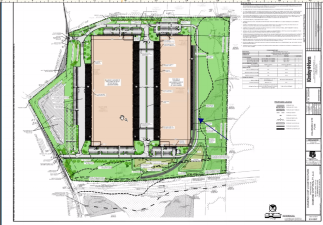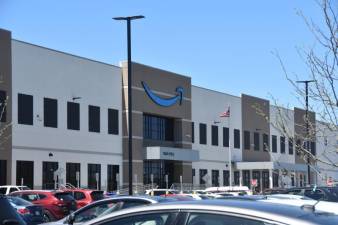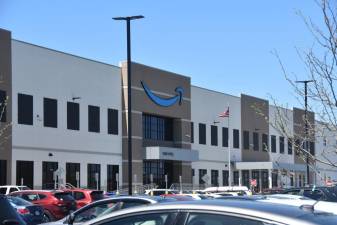Sparta’s mega-warehouse: town accused of changing ordinance for developers’ needs
The ongoing controversy behind the Diamond Chip warehouse proposal has spurred a grassroots push to stop the plan in its tracks, citing a lack of answers to many questions.
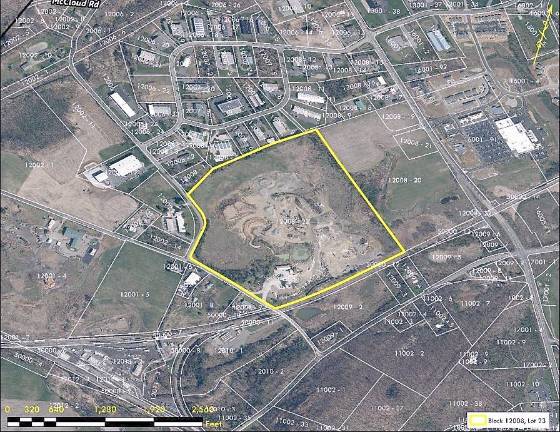
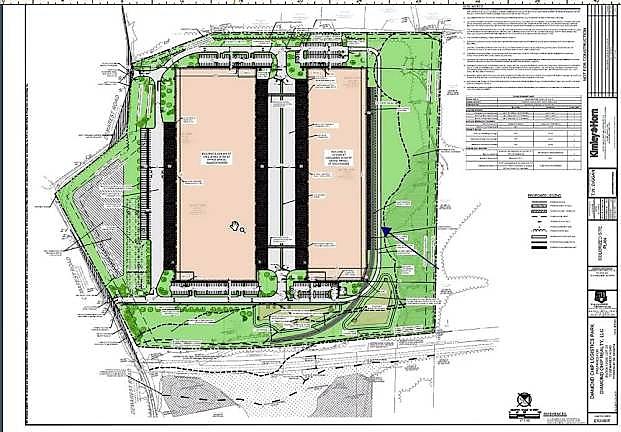
The June 1 Sparta Township Planning Board meeting further demonstrated the opposition to developer Diamond Chip Realty LLC’s application for a mega-warehouse at 33 Demarest Road, where Sparta Redi-Mix concrete supplier currently operates. Redi-Mix owner Frank Hunkele is also a partner in Diamond Chip Realty.
The project would not have been a “permitted use” under the former Land Use ordinance, but that ordinance was amended on February 23, 2021, with Ordinance 21-01, to allow greater building height (from 35 to 56 feet) and more impermeable (non-draining) surface area (from 40% to 65%) — two things this particular project requires.
For the greater part of the meeting, local attorneys representing those opposed to the project questioned Jim Ford, a partner at Diamond Chip Reality and owner of Transportation Real Estate Solutions in Bradenton, Fl. Ford seemingly failed to answer some questions while answering others haltingly and carefully. Since the proposed project doesn’t have a tenant, Ford could not answer questions about the expected use of the facility, like how many trucks would be using the facility during a day. He also didn’t address the impact on traffic or aquifer use beneath the site.
Attorney Lawrence Cohen, who represents nearby property owners, was the first to question Ford. Cohen asked Ford’s position with Diamond Chip Realty. Ford replied he has “an ownership interest: a formal operating agreement for development of the land, not operation of a company.”
Steven Gouin, the developer’s attorney, objected to several lines of questioning, characterizing them as not relevant; Planning Board Chairman Andrew Reina also objected. A member of the audience said “everything’s relevant.”
Ford admitted the operation could service as few as 20 trucks a day and did not know what the maximum number would be. He had no knowledge of a future tenant and conceded the operation could be up to three shifts, 24-hours a day with unloading at any time. At an earlier meeting, Ford had said the facility is intended for the storage of raw food products, finished food products, beverages, paper, packaging, and possibly electronics as well.
Cohen asked Ford if, “to his knowledge, anyone involved with the project requested the township make changes to the ordinance to accommodate this project,” alluding to the ordinance passed in February of last year. There was another objection from the developer’s attorney. The audience laughed. “Shocking!” someone commented. Cohen raised and lowered his forearm in a “here we go again” gesture.
Attorney Neil Clark was next. He and attorney Anand Dash are working pro bono for the community. Clark also founded the activist group “Sparta Responsible Development.”
At one point when Clark was questioning Ford, the township’s contract planner Katherine Sarmad, of Harbor Consultants, interrupted him and offered to help clarify Clark’s questioning by stating all the possible uses the site could permit. Clark replied, “Thank you for making the developer’s argument,” to loud applause from the audience. His fellow attorney, Anand Dash, later said, “She is a planner generally for Sparta Township—but in this instance, she’s advocating for the developer, when her duties require her to advocate for the board.”
According to an interview with Clark, other professionals hired by the town may have known about the upcoming application before the ordinance was amended. Clark told the Sparta Independent, “Township Planning Board contract engineer Bill Simmons met with the developer’s engineer Tony Diggins in October 2020 and inspected the site,” although it is not clear what (if anything) he knew about the developer’s plans at that time. Clark went on to suggest to the Sparta Independent that the ordinance was potentially changed to suit the needs of the developers, which was not originally disclosed to the councilmembers prior to their vote. “I asked each if they knew about it. Each of them said they did not,” he said.
Attorney Anand Dash pushed for further clarification on the property’s future uses, but was again told such questions were not relevant to the discussion.
“There was not sufficient disclosure of information by township professionals that would allow the township council to make a reasonable, informed decision as to the appropriateness of Ordinance 21-01,” was the view Dash later expressed to the Sparta Independent.
The meeting was ultimately dominated by the community’s and some township officials’ apparently growing conviction that Ordinance 21-01 should not have been passed.
At the time the proposed amendment was first introduced in January 2021, Town Councilman Dan Chiariello was the only member to question why it was necessary, and had voted against the change. He said he was told by town contract engineer Stan Puszcz (of CP Engineering) that “the existing Land Use Ordinance was being amended to bring the Economic Development Zone up to industry standards.” However, that statement was later contradicted by the developer’s attorney, Steve Gouin, who, at a March 2, 2022, meeting said he suggested two changes to the Land Use Ordinance for the project.
Town Councilwoman Molly Whilesmith said she “would not vote the same way now; much more information has come to light, including the size of the project. It’s 32 times bigger than the next largest warehouse. It became clear to me at the planning board meeting on March 2, on Zoom, when the developer’s attorney [Steven Gouin] stated ‘That was the reason for adopting the ordinance amendment to the E.D. zone, to permit this project.’ We did not know it was for this specific project.”
On a recording of the Feb. 2021 planning board meeting, Deputy Josh Hertzberg, who voted yes for the amendment, characterized it as “little changes that can be made that are just common sense, that will help the business community, and help the taxpayers of Sparta.”
The meeting ended at 10 p.m., with no remaining time for public comment.
Dash later commented, “There are some officials who seem to be failing to recognize that they have a duty to advocate for the best interest of the town.”
“There was not sufficient disclosure of information by township professionals that would allow the township council to make a reasonable, informed decision...” - local attorney Anand Dash.
